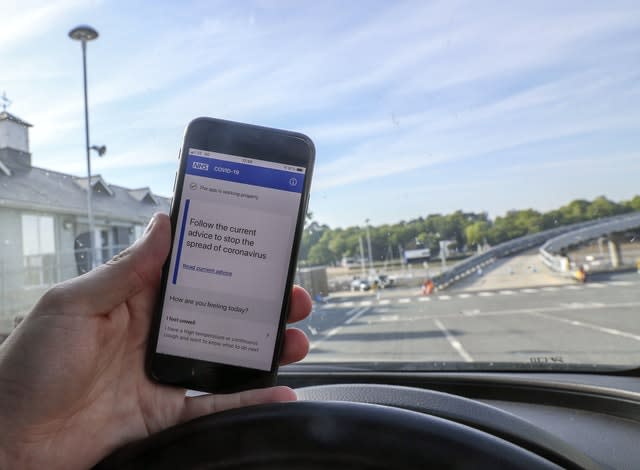Isle of Wight to test new Covid-19 tracing app followed by London borough
A coronavirus contact tracing app for England has edged a step closer with the launch of a new public trial, after months of delays.
The Isle of Wight will be at the helm once again alongside NHS volunteer responders across England from Thursday, followed next week by the London Borough of Newham, the Department of Health and Social Care (DHSC) said.
It comes after the Government ditched efforts to develop its own technology in June amid accuracy issues and concerns about privacy.
Health Secretary Matt Hancock first suggested it would be available in mid-May.

The second version adopts an Apple and Google-developed system – already used in several countries across the world – which handles data in a more privacy-friendly manner, using Bluetooth to keep an anonymous log of people a user has been close to that they may not know, such as a stranger on a bus.
It features alerts based on postcode, letting users know the level of coronavirus risk in their district, as well as QR check-in for whenever a user visits a public venue.
Venues and locations will be able to generate a QR code via the gov.uk website.
If a user is told to self-isolate, a timer feature will help count down that period.
Despite initial hype, officials have warned that contact tracing apps are not a “silver bullet” for coronavirus but could support the NHS Test and Trace effort.
Its effectiveness will also rely on public uptake. Even in countries like Iceland where 38% of the population are reported to have downloaded the contact tracing app, one expert overseeing it told MIT Technology Review it was not a “game changer”.

The ability of Bluetooth to both assess distance and duration between individuals has been tested in various scenarios including at a pub, a barbecue and on public transport.
Calculations from 100,000 simulations suggested a true positive rate of 69%, meaning around seven in 10 contacts who have been within two metres of a person who has tested positive will be correctly alerted.
A false positive rate of 45% however suggested that some 4.5 out of 10 people in close contact with someone but outside the two-metre boundary would be notified.
A spokesman for the department said: “Everyone receiving notifications that they have been close to a positive case is at risk of catching the virus – it would be irresponsible to suggest otherwise – they should take action, self-isolate and get tested.”
The calculations also suggested around a 30% false negative rate.
Regarding this figure, the department said it had worked with Google, Apple and the Alan Turing Institute to optimise the app and said the technology operates “in the same way as all other similar apps around the world and the level of accuracy is deemed to be as precise as human contact tracing”.
The spokesman added: “The app tells you about positive cases that you may not have not known about otherwise and complements the national NHS Test and Trace system.”
The app’s ability to detect a phone within a five-metre distance, either Android or Apple, is 99%.
The DHSC said its fresh attempt uses the latest security technology designed with user privacy in mind.
“We’ve worked with tech companies, international partners, privacy and medical experts to develop an app that is simple to use, secure and will help keep the country safe,” said Mr Hancock.
“Building on the feedback from the first phase, I want to thank Isle of Wight residents who will again play a vital national role in fighting this pandemic, joined by residents in Newham, London, and our incredible NHS volunteer responders.
“We are hugely grateful to everyone playing their part to rigorously test the new app and provide the foundation for a national rollout.”
It is still not clear when the Government intends to make the app more widely available across England, with those behind the app giving no firm timetable.
Changes can be made to the app on a weekly basis, according to user feedback during the trial.
Northern Ireland has already launched its own app, while Scotland is expected to have one by autumn.
“There is no silver bullet when it comes to tackling coronavirus,” said Dido Harding, executive chairwoman of the NHS Test and Trace programme.
“The app is a great step forward and will complement all of the work we are doing with local areas across the country to reach more people in their communities and work towards our vision of helping more people get back to the most normal life possible at the lowest risk.”

 Yahoo Finance
Yahoo Finance 